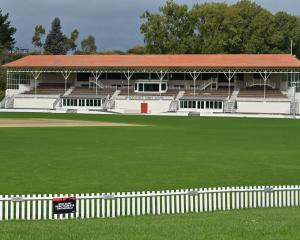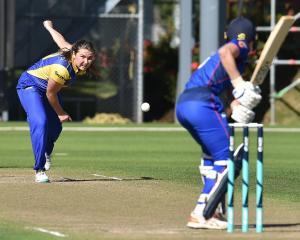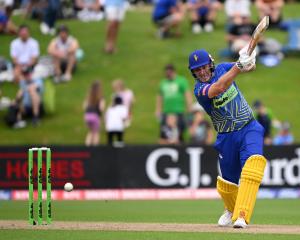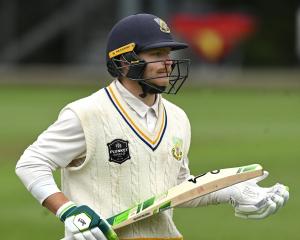
For many the narrative begins only when Mike Hesson, a long-time admirer of Brendon McCullum, is appointed coach in July.
In truth, the sorry saga stretches back to October 2009, when Andy Moles resigned after conceding he had, in modern sporting vernacular, lost the dressing room.
Suddenly, the spectre of player power loomed large.
McCullum, the vice-captain and obvious heir apparent to Daniel Vettori, was fingered as the biggest personality in the dressing room, a man with too much influence over the younger players in particular.
He was relieved of his vice-captaincy duties. Soon after, the quieter, less bolshie Ross Taylor was ushered into his position.
McCullum was furious, not with Taylor's ascension, but with his demotion and the tittle-tattle that accompanied it.
He resented the implication that he was somehow a negative influence on the team and lost respect for those he felt were propagating that line. He initially wanted nothing to do with leadership aspects of the team but quickly came around to thinking that it wouldn't do anybody any good.
Things appeared to sail along fairly smoothly until Vettori stood aside, prematurely perhaps, after the World Cup in March last year.
Rather than passing the baton directly to his vice-captain Taylor, New Zealand Cricket decided to have him and McCullum present for the job - a farcical situation because sources have told the Herald there was only ever one person coach John Wright was going to have as his skipper, and it wasn't McCullum.
So all the process did was turn what should have been a low-key coronation into a highly politicised, extremely partisan race.
Camps were established, rumour and innuendo were allowed to flourish. Taylor had high-profile and very vocal backing from Martin Crowe. His manager, Leanne McGoldrick, was known to have the ear of key people on the board.
McCullum, once managed by McGoldrick, was now represented and advocated by Stephen Fleming, arguably NZ's finest captain.
People inside cricket circles were being asked to take sides, fans were being asked to take sides.
Two of the most important players in the team were effectively being pitted against each other, having their pros and cons very publicly debated.
It might have made for an entertaining media sideshow, but in all other respects it was an appalling piece of management.
When chief executive David White sat down yesterday and said straight-faced that there were no issues with Taylor's captaincy, he must have been living in a vacuum for the past year.
Even before Hesson's appointment the whispers were growing louder that Taylor was struggling with certain aspects of the job, most notably communication.
He never looked entirely at ease in front of a microphone, but that's no deal breaker. It was certainly nothing that was particularly damning, and nothing that couldn't have been improved with time and experience, but it was there all the same.
The bowlers, it was said, were struggling to get a sense of what Taylor expected from them and were tired of the withering looks when they strayed off plan.
Again, there was nothing to suggest there was anything that would prove terminal to his leadership; it was painted more as an awkward bedding-in process.
That all changed when Hesson was appointed.
The writing might not have been on the wall, but it was certainly in the paper. This is how the Weekend Herald reported the appointment of Hesson, back on July 21.
"Taylor can no longer be guaranteed a long reign as captain.
"Taylor was very much a Wright appointment, chosen not only for his cricketing brain and undoubted talent, but also because he was more pliable than the other candidate, Brendon McCullum.
"Where Wright wanted players to do what they were told, Hesson said yesterday he wanted them to take more responsibility on their own shoulders.
"Quite apart from the fact they have an affinity for each other through their work at Otago, Hesson might argue McCullum is more suited to delivering that style of leadership."
It was obvious very early that Hesson and Taylor was not going to work. After the tour to India, there were noises that the coach wanted a change. Taylor scored a century in the final test at Bangalore that possibly bought him some time.
He did so again in Sri Lanka, after he had been asked to resign.
Many thought his superb batting and a highly meritorious victory would be enough to buy more time.
Unfortunately the noise was too loud by now and it was going public.
There was to be no turning back.
New Zealand Cricket was moving very slowly towards a giant train wreck and simply didn't have the wherewithal to avoid it.
White headed for Dubai and International Cricket Council business on Saturday. He characterised his five days away as dealing with "important international business" and conceded there had been "a void" of information in that time.
As is always the case, that void was filled with talkback chatter and social media tittle tattle, all of it incredibly damaging to Taylor, McCullum and cricket in general.
White has insisted player power had nothing to do with yesterday's decision.
"I don't believe so. Ross is well respected," he said.
Asked what had changed since Taylor was endorsed 16 months ago by a panel which included director of cricket John Buchanan, White said: "We've got a new coach."
Although publicly NZC is saying Hesson wanted Taylor to remain test captain, this reeks of compromise, rather than a firmly held conviction that Taylor was the best man for the test job.
It is known Taylor had started to feel increasingly isolated.
Opening batsman Martin Guptill is believed to have been a staunch ally; younger players in the squad have been identified as having been less than 100 per cent supportive of Taylor's leadership style.
Whatever the more intricate details, there's no question this imbroglio is at least on a par with the player power which did for Moles, if not quite up with the "biggie", the players strike of 2002.
The captaincy is worth about $40,000 but that's peanuts compared with the blow dealt to Taylor's pride this week.
Another outcome of yesterday is that NZC has once again lost the services of its former champion batsman Martin Crowe, who has resigned from the job of talent scout just weeks after accepting it. Crowe is a longtime supporter of Taylor.
Fleming's teammates have suggested it took him at least a couple of years to grow into the captaincy.
This is not to say Taylor would have become another Fleming. It does give pause for thought, though, whether he even had the chance.
- By Dylan Cleaver and David Leggat, The New Zealand Herald












